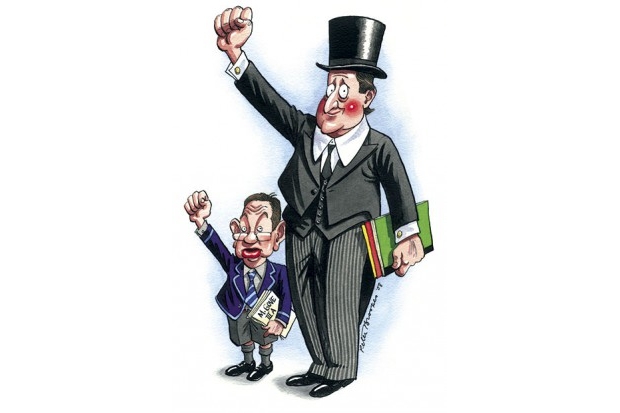I can claim a milligram of credit for David Cameron’s first star billing. In early 1991, standing in for the late John Junor on the Mail on Sunday and seeking a weekly instance of some Labour frontbencher making an eejit of himself, I inquired who was the best sniper in the Conservative Research Department. The answer was David Cameron. I phoned him and, for the next three weeks, one sheet of paper arrived with brief quotes, all of them firecrackers. Week four: the boy David is on leave, so his boss, Andrew Lansley, the then director of CRD, stands in. I receive 20 sheets of very damp squibs.
Around that time, a couple of Prime Minster’s Questions did not go well for the new PM. I asked John Major if he had enough political help; he thought that he could do with more. ‘Well, there is this bright lad in CRD… .’ David Cameron was summoned. He delivered. His reputation grew.
I found him an ideal political contact. He was particularly good at explaining economic policy. He had the clarity of mind, and the patience, to explain economic conundrums to an ignoramus, and would have made an excellent don. He also understood that economics was more than abstract theories or mathematical models. It was about human behaviour and its claims to scientific status should be treated with scepticism. David was always a political economist. He also displayed excellent political judgment.
At a high level, politics is a cat’s cradle of issues, underlying realities, media presentation, public opinion and electoral prospects, plus the politicians themselves: their abilities, their ambitions, their illusions and their vanities. A successful analyst needs high intellect and low cunning: a grasp of complex problems, plus Fingerspitzengefühl.
The rising youngster had all of that, as was increasingly recognised. His name often came up, always favourably. At the 1992 election, aged only 25, he was tasked with five men’s work. In charge of the PM’s morning briefing, he also ran the political section of CRD, a vital ammunition factory, as well as dealing with anything else that was thrown at him. He won golden opinions. I remember Chris Patten and Michael Portillo using identical language: simply the best of his type whom they had ever encountered.
His role demanded a lot of someone who could have been forgiven for youthful inexperience. By the end of the campaign, his strengths were taken for granted, his youth forgotten. To be fit for the highest command, politicians need brains but also stamina and judgment under fire. He displayed them all. By election night, shrewd judges of political horseflesh were talking about him as having the qualities to go all the way.
I remember having a long lunch with him on polling day. By then, there was nothing more that HQ could do. Amid the smoke and shell of the constituencies, the final phase of the battle was taking place. We were both nervous, inevitably, but for some reason neither of us was really in doubt. Despite the polls, despite the economy, we both thought that John Major would win. Why? Was it the soapbox versus the Sheffield rally: dogged decency versus glitz and meretriciousness? When Neil Kinnock came prancing and strutting on to the stage, Robin Cook turned to John Smith and said, ‘Isn’t this a bit Nuremberg Rally?’ ‘Hmm,’ replied John. ‘At least Hitler won an election.’ Or did we just take it for granted that common sense would prevail? I think I remember David Cameron using that exact phrase.
Nearly a quarter of a century later, there are parallels. In one respect, David Cameron should have an advantage over his predecessor. Prime Minister Major could promise a recovery. Prime Minister Cameron can point to one. At the beginning of the 1992 campaign, the Tories were behind in the polls and on the final weekend one of them gave Labour an eight-point lead. John Major did not waver. Nor did his young adviser. Here we are again: two weeks’ hard pounding ahead. Although the poll ratings are not moving, the Tories are well ahead on leadership and competence. As in 1992, there might well be a late swing; the Owl of Minerva may not fly until polling day. But in 1992, a young adviser predicted that common sense would win through. Twenty-three years later, a still youthful prime minister is making the same assumption.






Comments